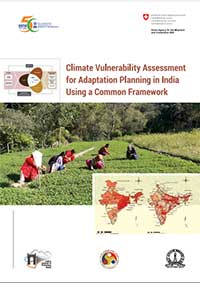Eight Indian States more vulnerable to Climate Change
In News
According to the national climate vulnerability assessment report Jharkhand, Mizoram, Odisha, Chhattisgarh, Assam, Bihar, Arunachal Pradesh and West Bengal are highly susceptible to climate change.
About
The report, titled "Climate Vulnerability Assessment for Adaptation Planning in India Using a Common Framework", which identifies the most vulnerable states and districts in India with respect to current climate risk and key factors of vulnerability, was released by Department of Science and Technology (DST).
The report has pointed out that these eight states need urgent intervention to adapt with the climate change.
Assam, Bihar and Jharkhand have over 60 per cent districts in the category of highly vulnerable districts among all the states.
One of the major reasons of vulnerability in Assam is absence of forest area per 100 rural population despite the fact that the state has a forest cover of 42 per cent, followed by low road density.
In case of Bihar, the report mentioned poor health infrastructure to be the key vulnerability driver in 36 districts. The rural employment scheme MGNREGA failed to be properly implemented causing a lack of alternative livelihood opportunities, emerged as a key factor in 14 districts of Bihar, and this was followed by a lack of women's participation in the workforce in 11 districts.
Paucity of crop insurance and rainfed agriculture were key factors of vulnerability for Jharkhand.
Himachal Pradesh, Telangana, Sikkim and Punjab have been categorized as lower-middle vulnerable states. Uttarakhand, Haryana, Tamil Nadu, Kerala, Nagaland, Goa and Maharashtra have been categorized as states with low vulnerability.
It has been pointed that mapping the vulnerable parts of India will help in taking appropriate action to combat climate change and the report should be made easily available to all stakeholders so that it can be advantageous to all climate-vulnerable communities across India through development of better-designed climate change adaptation projects.Even the maps should be made available to people who need it.
Climate risk can only be measured by assessing the vulnerability.
This nationwide exercise was jointly done by the DST and the Swiss Agency for Development & Cooperation (SDC).
This exercise hopes that the assessments will add to the development of more intended climate change projects.
These assessments will support India's National Action Plan on Climate Change and will also help policy-makers in starting appropriate climate actions. In a developing country as India, vulnerability assessment is observed as an important exercise to develop suitable adaptation projects and programmes.







